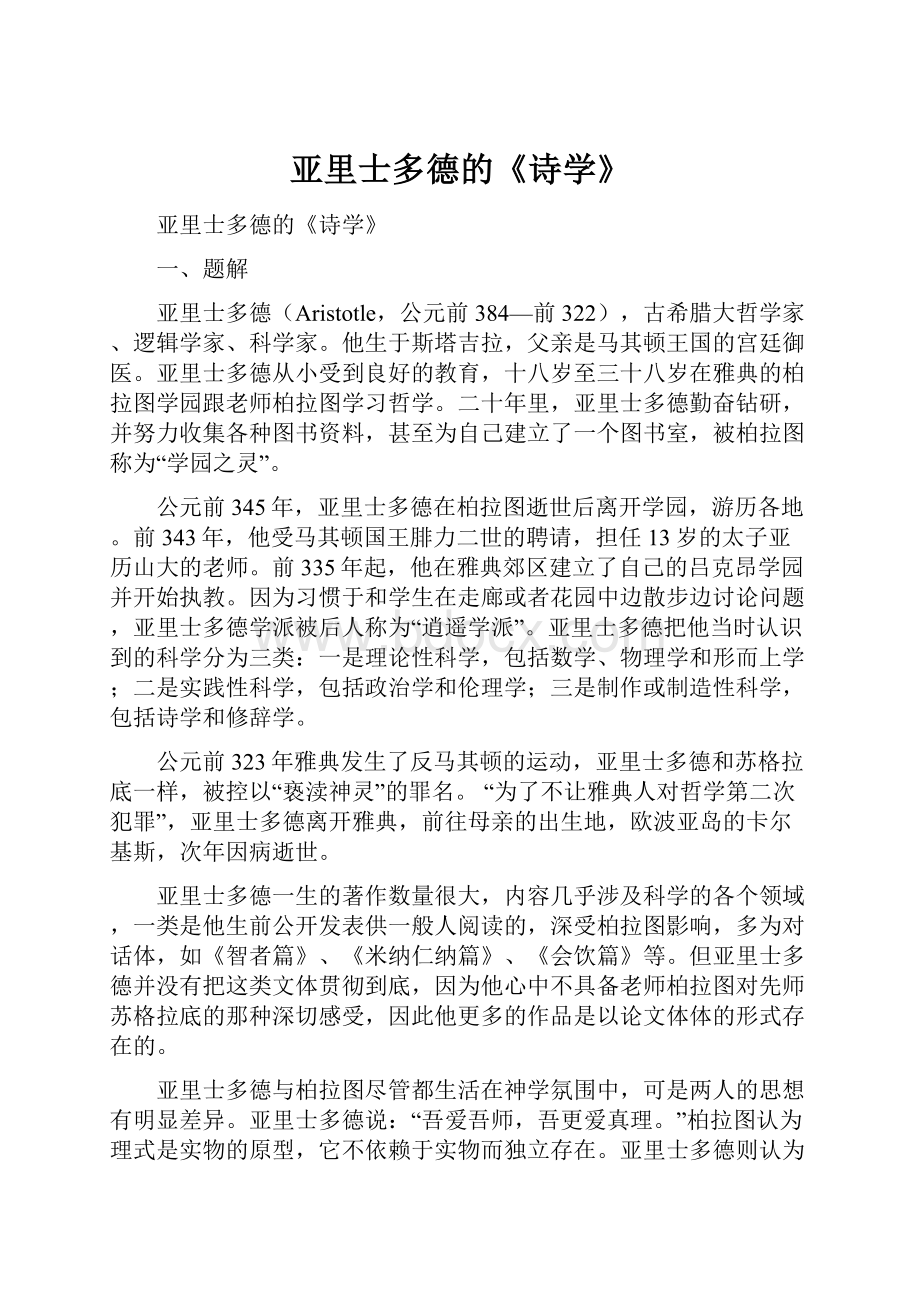亚里士多德的《诗学》.docx
《亚里士多德的《诗学》.docx》由会员分享,可在线阅读,更多相关《亚里士多德的《诗学》.docx(9页珍藏版)》请在冰豆网上搜索。

亚里士多德的《诗学》
亚里士多德的《诗学》
一、题解
亚里士多德(Aristotle,公元前384—前322),古希腊大哲学家、逻辑学家、科学家。
他生于斯塔吉拉,父亲是马其顿王国的宫廷御医。
亚里士多德从小受到良好的教育,十八岁至三十八岁在雅典的柏拉图学园跟老师柏拉图学习哲学。
二十年里,亚里士多德勤奋钻研,并努力收集各种图书资料,甚至为自己建立了一个图书室,被柏拉图称为“学园之灵”。
公元前345年,亚里士多德在柏拉图逝世后离开学园,游历各地。
前343年,他受马其顿国王腓力二世的聘请,担任13岁的太子亚历山大的老师。
前335年起,他在雅典郊区建立了自己的吕克昂学园并开始执教。
因为习惯于和学生在走廊或者花园中边散步边讨论问题,亚里士多德学派被后人称为“逍遥学派”。
亚里士多德把他当时认识到的科学分为三类:
一是理论性科学,包括数学、物理学和形而上学;二是实践性科学,包括政治学和伦理学;三是制作或制造性科学,包括诗学和修辞学。
公元前323年雅典发生了反马其顿的运动,亚里士多德和苏格拉底一样,被控以“亵渎神灵”的罪名。
“为了不让雅典人对哲学第二次犯罪”,亚里士多德离开雅典,前往母亲的出生地,欧波亚岛的卡尔基斯,次年因病逝世。
亚里士多德一生的著作数量很大,内容几乎涉及科学的各个领域,一类是他生前公开发表供一般人阅读的,深受柏拉图影响,多为对话体,如《智者篇》、《米纳仁纳篇》、《会饮篇》等。
但亚里士多德并没有把这类文体贯彻到底,因为他心中不具备老师柏拉图对先师苏格拉底的那种深切感受,因此他更多的作品是以论文体体的形式存在的。
亚里士多德与柏拉图尽管都生活在神学氛围中,可是两人的思想有明显差异。
亚里士多德说:
“吾爱吾师,吾更爱真理。
”柏拉图认为理式是实物的原型,它不依赖于实物而独立存在。
亚里士多德则认为实物本身包含着本质;柏拉图断言感觉不可能是真实知识的源泉,亚里士多德却认为知识起源于感觉;亚里士多德和柏拉图一样,认为理性方案和目的是一切自然过程的指导原理,可是亚里士多德对因果性的看法比柏拉图的更为丰富,他提出了事物的“四因说”:
第一种是质料因,即形成物体的主要物质。
第二种是形式因,即主要物质被赋予的设计图案和形状。
第三种是动力因,即为实现这类设计而提供的机构和作用。
第四种是目的因,即设计物体所要达到的目的。
其中形式因高于质料因,同时兼有动力因和目的因的作用,因此成为制造一切的力量或“第一推动力”(必需假定有“创造主”或“神”的存在),同时,形式因也决定了动力因和目的因。
亚里士多德认为,四因是不可分割的,它们的完美体现可以创造出美的、和目的性的“有机整体”,四因的相互关系决定了事物的多样性。
作为古希腊著名的哲学家,亚里士多德总结了泰利斯以来古希腊哲学发展的成果,首次将哲学和其他科学区别开来,开创了逻辑学、伦理学、政治学和生物学等学科的独立研究,他的学术思想对西方文化的发展产生了巨大的多方面的影响。
现代西方以至世界各地哲学中有许多词汇都导源于亚里士多德,恩格斯称他是古希腊哲学家中“最博学的人”。
《诗学》是西方历史上第一部比较系统的诗学著作。
与柏拉图驱逐诗人的态度不同,亚里士多德“打开门,请诗歌进来”。
在他看来,优秀的诗篇是天才加技艺的结果。
而《诗学》,就是亚里士多德根据自己的哲学原则,通过概括古希腊的艺术经验写成的探讨古希腊悲剧艺术的总结性著作。
《诗学》探讨了一系列的悲剧理论问题,比如艺术的首要原则、天性与模仿的关系、构成悲剧艺术的成分、悲剧的功用、情节的组合、悲剧和史诗的异同、悲剧的净化等等。
亚里士多德开创了西方现代诗学理论的先河,他的观点后来被古罗马哲学家贺拉斯在《诗艺》中加以发挥,从而间接影响了整个西方艺术史。
本书节选了《诗学》的第一章、第六章和第九章。
第一章,开宗明义提出了影响深远的“模仿说”。
首先,模仿是一切艺术的首要原则,它是《诗学》的中心概念和出发点,也是亚里士多德诗学理论的基础与核心。
亚里士多德认为诗之为诗,不在于它压韵、分行与文采,而因为它是模仿的产物。
但是,“模仿”不能简单地理解为对描写对象简单的描摹和照抄,其实质在于按照创作者对于世界的理解去模仿。
第二,艺术可以按照模仿的媒介、对象和方式来加以分类:
“史诗和悲剧,喜剧和酒神颂以及大部分双管箫乐和竖琴乐——这一切实际上是模仿,只是有三点差别:
即模仿所用的媒介不同,所取的对象不同,所采的方式不同。
”
第六章中,亚里士多德对悲剧下了定义:
“悲剧是对于一个严肃、完整、有一定长度的行动的模仿。
”这里,亚里士多德将“怜悯”与“恐惧”视为悲剧引起的情感,并指出悲剧的作用就的要使这种情感得到净化。
亚里士多德认为,构成悲剧的六个成分是:
戏景、性格、情节、言语、唱段与思想,其中情节是悲剧的根本和灵魂。
第九章中,亚里士多德强调:
诗与历史不同,它倾向于表现带有普遍性的事物,是一种比历史更富哲学性、更严肃的艺术。
历史所写的只是个别的已然的事,诗人的职责不在描述已经发生的事,而在描述可能发生的事,即按照可然律或必然律可能发生的事,因此,诗比历史显出更高的真实性。
诗不能够只模仿偶然性的现象,而是要揭示现象的本质和规律,要在个别人物事迹中见出必然性与普遍性。
二、诗学(节选)
POETICS
TranslatedbyS.H.Butcher
I
IPROPOSEtotreatofPoetryinitselfandofitsvariouskinds,notingtheessentialqualityofeach,toinquireintothestructureoftheplotasrequisitetoagoodpoem;intothenumberandnatureofthepartsofwhichapoemiscomposed;andsimilarlyintowhateverelsefallswithinthesameinquiry.Following,then,theorderofnature,letusbeginwiththeprincipleswhichcomefirst.
EpicpoetryandTragedy,ComedyalsoandDithyrambicpoetry,andthemusicofthefluteandofthelyreinmostoftheirforms,areallintheirgeneralconceptionmodesofimitation.Theydiffer,however,fromoneanotherinthreerespects—themedium,theobjects,themannerormodeofimitation,beingineachcasedistinct.
Forastherearepersonswho,byconsciousartormerehabit,imitateandrepresentvariousobjectsthroughthemediumofcolorandform,oragainbythevoice;sointheartsabovementioned,takenasawhole,theimitationisproducedby
rhythm,language,or'harmony',eithersinglyorcombined.
Thusinthemusicofthefluteandofthelyre,'harmony'andrhythmaloneareemployed;alsoinotherarts,suchasthatoftheshepherd'spipe,whichareessentiallysimilartothese.Indancing,rhythmaloneisusedwithout'harmony';forevendancingimitatescharacter,emotion,andaction,byrhythmicalmovement.
Thereisanotherartwhichimitatesbymeansoflanguagealone,andthateitherinproseorverse-whichverse,again,mayeithercombinedifferentmetersorconsistofbutonekind-butthishashithertobeenwithoutaname.ForthereisnocommontermwecouldapplytothemimesofSophronandXenarchusandtheSocraticdialoguesontheonehand;and,ontheother,topoeticimitationsiniambic,elegiac,oranysimilarmeter.Peopledo,indeed,addtheword'maker'or'poet'tothenameofthemeter,andspeakofelegiacpoets,orepic(thatis,hexameter)poets,asifitwerenottheimitationthatmakesthepoet,buttheversethatentitlesthemalltothename.Evenwhenatreatiseonmedicineornaturalscienceisbroughtoutinverse,thenameofpoetisbycustomgiventotheauthor;andyetHomerandEmpedocleshavenothingincommonbutthemeter,sothatitwouldberighttocalltheonepoet,theotherphysicistratherthanpoet.Onthesameprinciple,evenifawriterinhispoeticimitationweretocombineallmeters,asChaeremondidinhisCentaur,whichisamedleycomposedofmetersofallkinds,weshouldbringhimtoounderthegeneraltermpoet.
Somuchthenforthesedistinctions.
Thereare,again,someartswhichemployallthemeansabovementioned-namely,rhythm,tune,andmeter.SuchareDithyrambicandNomicpoetry,andalsoTragedyandComedy;butbetweenthemoriginallythedifferenceis,thatinthefirsttwocasesthesemeansareallemployedincombination,inthelatter,nowonemeansisemployed,nowanother.
Such,then,arethedifferencesoftheartswithrespecttothemediumofimitation.
VI
Ofthepoetrywhichimitatesinhexameterverse,andofComedy,wewillspeakhereafter.LetusnowdiscussTragedy,resumingitsformaldefinition,asresultingfromwhathasbeenalreadysaid.
Tragedy,then,isanimitationofanactionthatisserious,complete,andofacertainmagnitude;inlanguageembellishedwitheachkindofartisticornament,theseveralkindsbeingfoundinseparatepartsoftheplay;intheformofaction,notofnarrative;throughpityandfeareffectingtheproperpurgationoftheseemotions.By'languageembellished,'Imeanlanguageintowhichrhythm,'harmony'andsongenter.By'theseveralkindsinseparateparts',Imean,thatsomepartsarerenderedthroughthemediumofversealone,othersagainwiththeaidofsong.
Nowastragicimitationimpliespersonsacting,itnecessarilyfollowsinthefirstplace,thatSpectacularequipmentwillbeapartofTragedy.Next,SongandDiction,forthesearethemediaofimitation.By'Diction'Imeanthemeremetricalarrangementofthewords:
asfor'Song,'itisatermwhosesenseeveryoneunderstands.
Again,Tragedyistheimitationofanaction;andanactionimpliespersonalagents,whonecessarilypossesscertaindistinctivequalitiesbothofcharacterandthought;foritisbythesethatwequalifyactionsthemselves,andthese—thoughtandcharacter—arethetwonaturalcausesfromwhichactionsspring,andonactionsagainallsuccessorfailuredepends.Hence,thePlotistheimitationoftheaction:
—forbyplotIheremeanthearrangementoftheincidents.ByCharacterImeanthatinvirtueofwhichweascribecertainqualitiestotheagents.Thoughtisrequiredwhereverastatementisproved,or,itmaybe,ageneraltruthenunciated.
EveryTragedy,therefore,musthavesixparts,whichpartsdetermineitsquality—namely,Plot,Character,Diction,Thought,Spectacle,Song.Twoofthepartsconstitutethemediumofimitation,onethemanner,andthreetheobjectsofimitation.Andthesecompletethefist.Theseelementshavebeenemployed,wemaysay,bythepoetstoaman;infact,everyplaycontainsSpectacularelementsaswellasCharacter,Plot,Diction,Song,andThought.
Butmostimportantofallisthestructureoftheincidents.ForTragedyisanimitation,notofmen,butofanactionandoflife,andlifeconsistsinaction,anditsendisamodeofaction,notaquality.Nowcharacterdeterminesmen'squalities,butitisbytheiractionsthattheyarehappyorthereverse.Dramaticaction,therefore,isnotwithaviewtotherepresentationofcharacter:
charactercomesinassubsidiaryto
theactions.Hencetheincidentsandtheplotaretheendofatragedy;andtheendisthechiefthingofall.Again,withoutactiontherecannotbeatragedy;theremaybewithoutcharacter.Thetragediesofmostofourmodernpoetsfailintherenderingofcharacter;andofpoetsingeneralthisisoftentrue.Itisthesameinpainting;andhereliesthedifferencebetweenZeuxisandPolygnotus.Polygnotusdelineatescharacterwell;thestyleofZeuxisisdevoidofethicalquality.Again,ifyoustringtogetherasetofspeechesexpressiveofcharacter,andwellfinishedinpointofdictionandthought,youwillnotproducetheessentialtragiceffectnearlysowellaswithaplaywhich,howeverdeficientintheserespects,yethasaplotandartisticallyconstructedincidents.Besideswhich,themostpowerfulelementsofemotionalinterestinTragedy—PeripeteiaorReversaloftheSituation,andRecognitionscenes—arepartsoftheplot.Afurtherproofis,thatnovicesintheartattaintofinishofdictionandprecisionofportraiturebeforetheycanconstructtheplot.Itisthesamewithalmostalltheearlypoets.
Theplot,then,isthefirstprinciple,and,asitwere,thesoulofatragedy;Characterholdsthesecondplace.Asimilarfactisseeninpainting.Themostbeautifulcolors,laidonconfusedly,willnotgiveasmuchpleasureasthechalkoutlineofaportrait.ThusTragedyistheimitationofanaction,andoftheagentsmainlywithaviewtotheaction.
ThirdinorderisThought,—thatis,thefacultyofsayingwhatispossibleandpertinentingivencircumstances.Inthecaseoforatory,thisisthefunctionofthepoliticalartandoftheartofrhetoric:
andsoindeedtheolderpoetsmaketheircharactersspeakthelanguageofciviclife;thepoetsofourtime,thelanguageoftherhetoricians.Characteristhatwhichrevealsmoralpurpose,showingwhatkindofthingsamanchoosesoravoids.Speeches,therefore,whichdonotmakethismanifest,orinwhichthespeakerdoesnotchooseoravoidanythingwhatever,arenotexpressiveofcharacter.Thoug